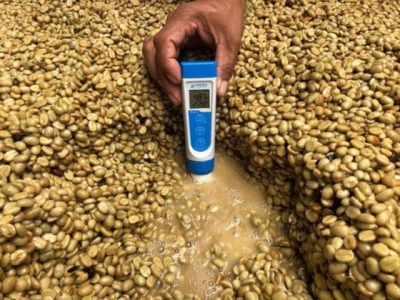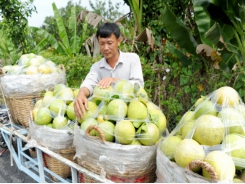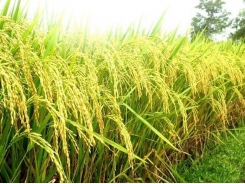Enhance the value-added of Vietnamese coffee

Regarding how biotechnology may be utilized to enhance the quality of Vietnamese Robusta and Arabica coffee, experts mentioned the fermentation process to enhance the flavor and fragrance of coffee, thus increasing its added value.
Measure PH content during coffee fermentation.
The conference on the aforementioned subject featured representatives from the Department of Agricultural Products Processing and Development, the Department of Science and Technology in Dak Nong, as well as numerous scientists and specialists from Hoang Gia Trading Development & Import-Export Joint Stock Company and Lallemand Corporation of Canada.
Accordingly, coffee experts imparted some fermentation methods to increase the flavor and quality of coffee, which was brought to Vietnam. However, coffee fermentation is a little-understood subject. At this conference, specialists and scientists presented experimental findings from many coffee-producing regions in Vietnam, which included a variety of enterprises and businesses and resulted in several good outcomes.
Storage tank for fermentation of coffee by selective microorganisms with less water consumption and short fermentation time.
The fermentation process is critical in coffee manufacturing since it not only reduces the sticky content but also has an effect on taste and sensory perception. Controlling fermentation throughout processing enables a greater degree of control over the product's quality and consistency. Fermentation, on the other hand, is a complicated process that is controlled according to farm scale.
Controlling the fermentation process is key for unlocking the potential for good taste attributes. Fermentation – which occurs naturally in all stages of coffee processing – provides a chance to impact the taste. Producers and roasters can guarantee taste variety while increasing coffee uniformity and quality by recognizing the power of fermentation and processing.
Coffee fermentation by selective microorganisms can be used in a variety of simple tanks.
Margaret Fundira, Food Manager at Lallemand Café, explains that each kind of yeast has a unique fermentation application and produces a unique sort of product. For coffee, the fermentation process is geared at developing the coffee's fragrance. Each fermentation process will have a unique set of enzyme activities, and our goal with the coffee fermentation process is to improve the flavor of the coffee. While spontaneous fermentation may create the distinctive aroma of indigenous microbes, it also carries the risk of spoiling and the production of unwanted compounds. Thus, the management of fermenting microbes will aid in the discovery of novel flavors, allowing for the creation of unique goods tailored to the tastes of customers in niche markets across the globe.
At the conference, scientists working in the area of coffee discussed the fermentation process and its outcomes. Fermentation control will aid in the control of dangerous bacteria that influence the flavor of the coffee. Additionally, it contributes to coffee quality improvement by reducing production time by rapidly eliminating mucus during the coffee bean extraction process. Simultaneously, it decreases the amount of water used in the coffee manufacturing process. Additionally, the experts made recommendations about the tanks used for coffee fermentation to simplify this procedure.
Simexco Dak Lak representatives also presented the findings of Cima - Lellemand yeast experiments conducted at the Ea Tan cooperative during the previous coffee season. After comparing Cima yeast fermentation to natural fermentation, the Cima fermentation produced the greatest results, with delicious smelt of dried banana, mango, and dark chocolate and a deeper, more attractive coffee bean color than natural fermentation.
The employment of fermenting microorganisms is uncommon in the coffee business since most manufacturers see fermentation as a risk mechanism that degrades quality, rather than considering the advantages of tastes created by microorganism strains.
However, fermentation in the brewing tanks results in the formation of secondary metabolites referred to as taste precursors (reabsorbed into the coffee bean). In this manner, fermenting coffee results in a product with a greater value than organically treated coffee. This technique will assist the coffee business in developing various tastes to appeal to a variety of consumers, thus boosting the value of Vietnamese coffee.
Có thể bạn quan tâm
Phần mềm

Phối trộn thức ăn chăn nuôi

Pha dung dịch thủy canh

Định mức cho tôm ăn

Phối trộn phân bón NPK

Xác định tỷ lệ tôm sống

Chuyển đổi đơn vị phân bón

Xác định công suất sục khí

Chuyển đổi đơn vị tôm

Tính diện tích nhà kính

Tính thể tích ao hồ




 Many longan areas are qualified for exports to…
Many longan areas are qualified for exports to…  ST24 and ST25 exports sharply increase thanks to…
ST24 and ST25 exports sharply increase thanks to…